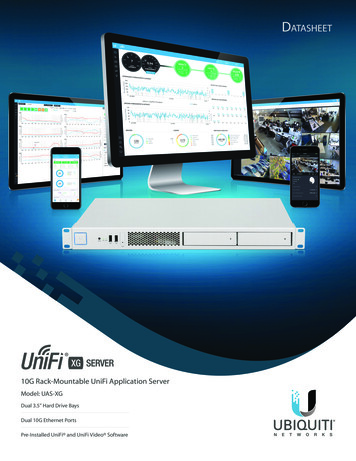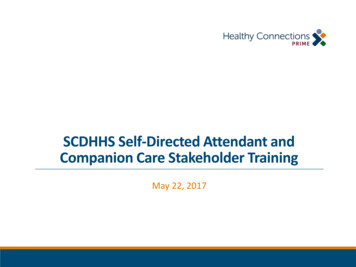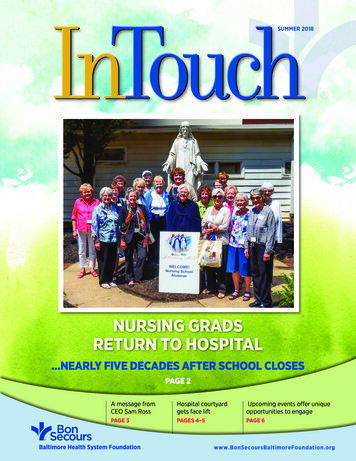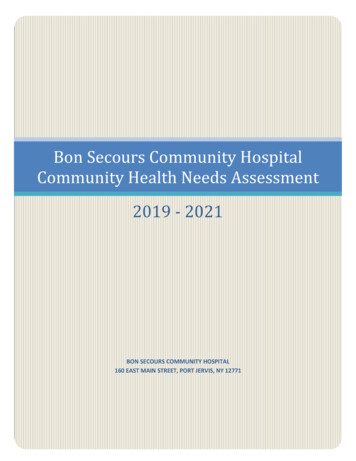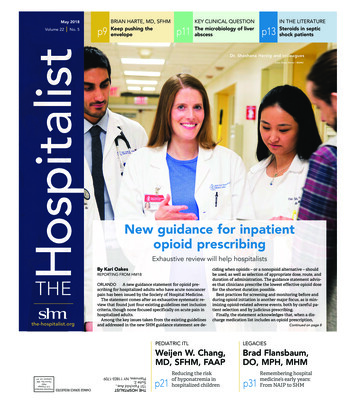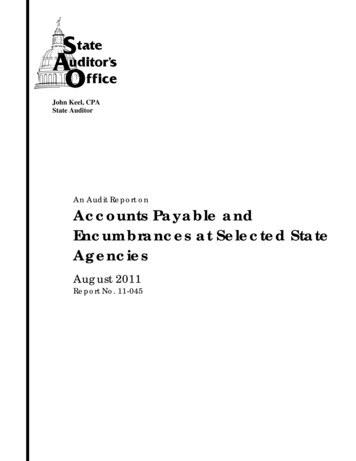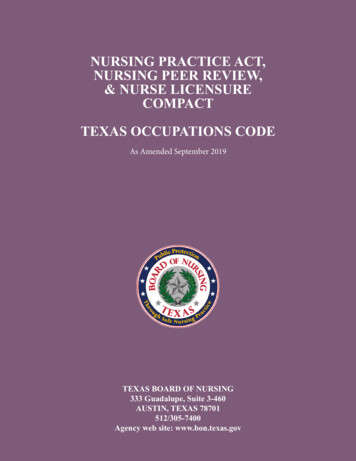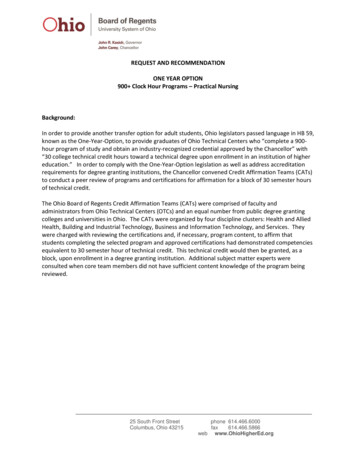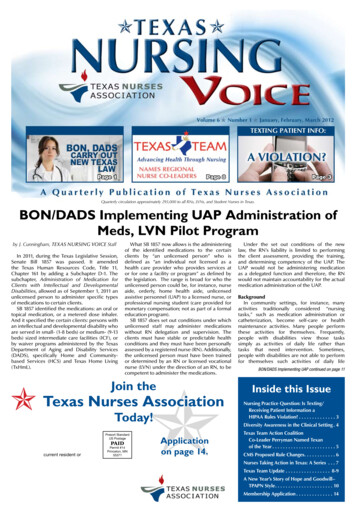
Transcription
Page 1Page 8Page 3Quarterly circulation approximately 293,000 to all RNs, LVNs, and Student Nurses in Texas.BON/DADS Implementing UAP Administration ofMeds, LVN Pilot Programby J. Cunningham, Texas Nursing Voice StaffIn 2011, during the Texas Legislative Session,Senate Bill 1857 was passed. It amendedthe Texas Human Resources Code, Title 11,Chapter 161 by adding a Subchapter D-1. Thesubchapter, Administration of Medication forClients with Intellectual and DevelopmentalDisabilities, allowed as of September 1, 2011 anunlicensed person to administer specific typesof medications to certain clients.SB 1857 identified the medications: an oral ortopical medication, or a metered dose inhaler.And it specified the certain clients: persons withan intellectual and developmental disability whoare served in small- (1-8 beds) or medium- (9-13beds) sized intermediate care facilities (ICF), orby waiver programs administered by the TexasDepartment of Aging and Disability Services(DADS), specifically Home and Communitybased Services (HCS) and Texas Home Living(TxHmL).What SB 1857 now allows is the administeringof the identified medications to the certainclients by “an unlicensed person” who isdefined as “an individual not licensed as ahealth care provider who provides services ator for one a facility or program” as defined bythe legislation. The range is broad for who theunlicensed person could be, for instance, nurseaide, orderly, home health aide, unlicensedassistive personnel (UAP) to a licensed nurse, orprofessional nursing student (care provided formonetary compensation; not as part of a formaleducation program).SB 1857 does set out conditions under whichunlicensed staff may administer medicationswithout RN delegation and supervision. Theclients must have stable or predictable healthconditions and they must have been personallyassessed by a registered nurse (RN). Additionally,the unlicensed person must have been trainedor determined by an RN or licensed vocationalnurse (LVN) under the direction of an RN, to becompetent to administer the medications.Join theTexas Nurses AssociationToday!Presort StandardUS PostagePAIDcurrent resident orPermit #14Princeton, MN55371Under the set out conditions of the newlaw, the RN’s liability is limited to performingthe client assessment, providing the training,and determining competency of the UAP. TheUAP would not be administering medicationas a delegated function and therefore, the RNwould not maintain accountability for the actualmedication administration of the UAP.BackgroundIn community settings, for instance, manyactivities traditionally considered “nursingtasks,” such as medication administration orcatheterization, become self-care or healthmaintenance activities. Many people performthese activities for themselves. Frequently,people with disabilities view those taskssimply as activities of daily life rather thantasks that need intervention. Sometimes,people with disabilities are not able to performfor themselves such activities of daily lifeBON/DADS Implementing UAP continued on page 11Inside this IssueNursing Practice Question: Is Texting/Receiving Patient Information aHIPAA Rules Violation?. . . . . . . . . . . . . . 3Diversity Awareness in the Clinical Setting. 4Applicationon page 14.Texas Team Action CoalitionCo-Leader Perryman Named Texanof the Year. . . . . . . . . . . . . . . . . . . . . . . . 5CMS Proposed Rule Changes. . . . . . . . . . . . 6Nurses Taking Action in Texas: A Series . . . 7Texas Team Update. . . . . . . . . . . . . . . . . . 8-9A New Year’s Story of Hope and Goodwill–TPAPN Style. . . . . . . . . . . . . . . . . . . . . . . 10Membership Application. . . . . . . . . . . . . . . 14
Page 2 Texas Nursing VoiceJanuary, February, March 2012Texas Nurses Association Districts and PresidentsPresidents of the 28 state-wide Districts of Texas Nurses Association, as wellas some District offices, are listed below. They invite you to contact them withquestions or comments about TNA District membership and involvement.District 1:Laura SarmientoPhone: t 2:Beth TerryPhone: 806.358-4596E-mail: bterry@amarilloheartgroup.comDistrict 3:Dennis CheekPhone: 817.201-3334E-mail: d.cheek@tcu.eduDistrict Address:Renee JamesP.O. Box 16958Ft. Worth, TX 76162Office: 817.249-5071E-mail: tna3@usapathway.comWebsite: www.tna3.orgDistrict 4:Frances (Frankie) PhillipsPhone: 214. 857-1487E-mail: frances.phillips@va.govDistrict Address:Pat PollockP.O. Box 764468Dallas, TX 75376Office: 972.435-2216E-mail: d4tna@flash.netWebsite: www.tnad4.orgDistrict 5:Gail AcunaPhone: : www.tna5.orgDistrict 6:Paula StangelandPhone: 409.741-1667E-mail:pstangeland9@gmail.comWebsite: www.tna6.orgDistrict 7:Linda PehlPhone: 254.295-4665E-mail: lpehl@umhb.eduDistrict Address:P.O. Box 3041Temple, TX 76501District 8:Sarah WilliamsPhone: 210.829-6092E-mail: williajs@uiwtx.eduWebsite: www.texasnurses.org/districts/08/District 9:Dana BjarnasonPhone: 713.873-3009E-mail: dana bjarnason@hchd.tmc.eduDistrict Office:Melanie Truong2370 Rice Blvd., #109Houston, TX 77005Office: 713.523-3619E-mail: tna9@tnadistrict9.orgWebsite: www.tnadistrict9.orgDistrict 18:Jeff WatsonPhone: 806.775-9795E-mail: jeff.watson@umchealthsystem.comWebsite: www.texasnurses.org/districts/18/District 19:Tara PattonPhone: 903.391-1153E-mail:power4nurses@gmail.comWebsite: www.texasnurses.org/districts/19/District 20:Denise NeillPhone: 361.570-4277E-mail: NeillD@uhv.eduDistrict 10:Joyce SimsPhone: 254.299-8150E-mail: jsims@mclennan.eduDistrict 11:Marcy BeckPhone: 940.766-5362E-mail: marcy.beck@mwsu.eduDistrict 12:Alicia BoazePhone: 409. 212-7432E-mail: alicia.boaze@bhset.netDistrict 21:Rebekah PowersPhone: 432.685-1111E-mail: Rebekah.powers@midland-memorial.comDistrict 22:Toni McDonaldE-mail: tmcdonald@hcewildblue.comDistrict 25:Inger ZeruchaPhone: 903.315-2632E-mail: zinger65@sbcglobal.netDistrict 13:VacantDistrict 26:VacantDistrict 14:Joe LacherPhone: 956.882-5072E-mail: joe.lacher@utb.eduDistrict 28:Jenny WilderPhone: 903.826-2712E-mail:jennyrwilder@gmail.comDistrict 15:Andrea KerleyPhone: 325.670-4230E-mail: akerley@hendrickhealth.orgWebsite: www.texasnurses.org/districts/15/District 29:Beverly HowardPhone: 713.554-1091E-mail:brv1258@yahoo.comDistrict 16:Wilma Powell StuartPhone: 325.481-8404E-mail: wilmastuart@shannonhealth.orgDistrict 35:Kim GatlinPhone: 903.466-6982E-mail: kgatlin@ntcc.eduDistrict 17:Eve LaymanPhone: 361.825-3781E-mail: evelayman@yahoo.comWeb site: www.texasnurses.org/districts/17/District 40:Contact TNAPhone 800.862-2022 ext. rg Nationally accredited No campus visits Competitive Tuition Liberal Credit TransfersCourses that fit your schedule. Enroll today!Go to: http://bsn-linc.wisconsin.eduToll Free: 1-877-656-1483Published by:Arthur L. DavisPublishing Agency, Inc.TEXAS NURSING VoiceA publication of Texas Nurses AssociationJanuary, February, March 2012Volume 6, Number 1Editor-in-Chief – Clair B. Jordan, MSN, RNManaging Editor – Joyce CunninghamCreative Communications – Deborah TaylorCirculation Manager – Belinda RicheyEditorial ContributorsTherese Clinch, MSN, RN; Ginger Coburn, LCDC;Joyce Cunningham; Alexia Green, PhD, RN, FAAN;Christy Meriwether; Michael Van Doren, MSN, RN, CARNEditorial Advisory BoardStephanie Woods, PhD, RN, DallasJose Alejandro, MSN, RN, MBA, CCM, DallasPatricia Allen, EdD, RN, CNE, ANEF, LubbockSandra Kay Cesario, PhD, RN, C, PearlandJennifer D.M. Cook, PhD, MSN, RN, San AntonioAnita J. Coyle, PhD, RN, CHES, SangerThelma L. Davis, LVN, GiddingsAnita T. Farrish, RN, MHSM, NE-BC, WacoPatricia Goodpastor, RN, The WoodlandsPatricia Holden-Huchton, RN, DSN, DentonTara A. Patton, BSN, RN, PalestineDianna Lipp Rivers, RN, CNAA, BC, BeaumontExecutive OfficersMargie Dorman-O’Donnell, MSN, RN, PresidentVictoria England, RN, MBA, Vice PresidentClaudia Turner, MSN, RN, Secretary-TreasurerRegional Directors of Texas Nurses AssociationJune Marshall, DNP, RN, NEA-BC – North RegionEve Layman, PhD, RN, NEA-BC – South RegionKim Belcik, BSN, RN-BC – Central RegionViola Hebert, MA, BSN, RN – East RegionJo Rake, MSN, RN, CNAA – West RegionExecutive DirectorClair B. Jordan, MSN, RNTEXAS NURSING Voice is published quarterly –January, February, March; April, May, June; July, August,September; and October, November, December by –Texas Nurses Association, 7600 Burnet Road, Suite 440,Austin, TX 78757-1292.Editorial OfficeTEXAS NURSING Voice, 7600 Burnet Road, Suite 440,Austin, TX 78757-1292512.452-0645, e-mail tnveditorial@texasnurses.orgAddress ChangesSend address changes toTexas Nurses Association, 7600 Burnet Road,Suite 440, Austin, TX 78757-1292,e-mail: tnvcirculation@texasnurses.orgAdvertisingArthur L. Davis Publishing Agency, Inc.,517 Washington St.P.O. Box 216, Cedar Falls, Iowa 50613800.626-4081, E-mail: sales@aldpub.comTexas Nurses Association and the Arthur L. DavisPublishing Agency, Inc. reserve the right to reject anyadvertisement. Responsibility for errors in advertisingis limited to corrections in the next issue or refund ofprice of advertisement.Acceptance of advertising does not implyendorsement or approval by Texas Nurses Association(TNA) of products advertised, the advertisers, or theclaims made. Rejection of an advertisement does notimply a product offered for advertising is without merit,or that the manufacturer lacks integrity, or that thisassociation disapproves of the product or its use. TNAand the Arthur L. Davis Publishing Agency, Inc. shallnot be held liable for any consequences resulting frompurchase or use of an advertiser’s product. Articlesappearing in this publication express the opinions ofthe authors; they do not necessarily reflect the views ofthe staff, board, or membership of TNA or those of thenational or local associations.Copyright 2011 by Texas Nurses Association,a constituent member of theAmerican Nurses Association.
January, February, March 2012Texas Nursing Voice Page 3Nursing Practice Question: Is Texting/Receiving PatientInformation a HIPAA Rules Violation?by Therese Clinch, MSN, RN, Practice Director,Texas Nurses AssociationA growing trend in health care today is thepractice of physicians texting patient information– specifically, texting orders to other physicians,independent licensed practitioners, and nursesin hospitals or other health care settings. Sure,it’s a fast, convenient method for physicians torelay information and orders but is it legal?The answer is No. Texting patient informationis not legal unless the text messages aretransmitted through a secure and encryptednetwork.According to The Joint Commission1, itis not acceptable for physicians or licensedindependent practitioners to text patientinformation or patient orders to nurses,physicians, licensed independent practitionersin the hospital or other health care setting. Thereasons: Text messages do not provide messagerecipients with the ability to verify theidentity of the person sending the text, and There is no way to keep the original textmessage as validation of what is entered intothe medical record.people who seek care and healing. Given thatthe health care marketplace is diverse, the Ruleis designed to be flexible and comprehensiveto cover the variety of uses and disclosures thatneed to be addressed.”The nurse’s duty is to ensure patientsafety and security of patient information inthe workplace. Nurses need to know theirworkplace’s policies or protocols on the textingof patient information. Most of all, nurses mustreport any repeated violations related to thispractice through the workplace’s chain ofcommand to ensure that no HIPAA violationoccurs.If the practice of texting patient informationother than over a secure and encryptednetwork is going on in your workplace, it’syour responsibility to immediately notify yoursupervisor. This practice of sending/receiving textmessages of patient information can lead toHIPAA violations for the hospitals or healthcare settings, and to the person or personswho accept and act upon the texted messagesof patient information or orders. The violationscan range from civil law suits to criminal suitsresulting in fines up to 50,000 and up toone-year imprisonment for any person whoknowingly obtains or discloses individuallyidentifiable patient health information².The Standards for Privacy of IndividuallyIdentifiable Health Information, the “PrivacyRule” that implements the requirements of theHealth Insurance Portability and AccountabilityAct of 1996, establishes the protection of certainhealth information. As is explained by the U.S.Department of Health & Human Services HIPAAPrivacy Rule:“A major goal of the Privacy Rule is to assurethat individuals’ health information is properlyprotected while allowing the flow of healthinformation needed to provide and promotehigh quality health care and to protect thepublic’s health and well being. The Rule strikesa balance that permits important uses ofinformation, while protecting the privacy ofReferences1. The Joint Commission (2011), Standards FrequentlyAsked Questions (FAQs) accessed on 11/23/2011 from www.jointcommission.org/standards.2. US Department of Health and Human Services (2011),HIPAA rules accessed on 12/ 6/2011 from www.hhs.gov/ocr/privacy/hipaa.Comments/questions are welcomed atpractice@texasnurses.orgI’m not just a nurse.Apply Today:I’m inventing new modelsof Veteran’s health care.VAcareers.va.govFollow VA CareersChris, VA NurseEducationis a journey.Discover yours.Start the New Year withNew SurroundingsEnjoy going to work each day without the hassle ofheavy traffic. Have an uncomplicated drive in thecountry and come to a facility that cares enough tomake a difference in the lives of our residents.Cypress Woods Care Center135 ½ Hospital Dr.Angleton, TX 77515979-849-8221RN s,LVNs,CN AsOnline.Registration is free, fast, confidentialand easy! You will receive an e-mailwhen a new job posting matchesyour job search.Become Your Own Boss andLOVE Your NEW Nursing CareerNew Career for Nurses,3-Day Certification Course,Receive continuing education creditand a new credential,Secret to Becoming a 6-Figure NurseRevealed Here“America’s FavoriteNursing Educator”Tracy McClelland Enterprise, IncNursing Success System1214 North Peterson Ave Suite PDouglas, GA uccesssystem.comFor my FREE Special Nursing Report visit me onlineAustin StateHospitalRNs/LVNsTake care of your patients AND your career with a CCNE-accreditednursing degree from WGU Texas! who are able to work withpersons with mental illness.Experience preferred butnot required. Ability tocommunicate a must.Call 512-419-2628, come by4110 Guadalupe, or applyonline at:https://rm.accesshr.hhsc.state.tx.us & select“applicant” under careeropportunities and selectfacility location of AustinState Hospital and search.EEO. Drug Screen,references and criminalbackgroundcheck required.“Partnering to Find SolutionsToward Wellness” Relevant and Accredited—CCNE-accredited degree programs designed to producehighly qualified, caring nurses, educators, and administrators.Flexible—Log in and learn anytime, anywhere you can find the time before, during,and after rigorous nursing shifts.Affordable—One of the best values in higher education, WGU Texas tuition is amongthe most affordable in the entire country.Competency-based—Challenging programs that measure your learning rather thanyour time spent in class.Programs begin the first of every month. Your future can start right now!*RN Prelicensure programs available in select 8.549.29921.800.620.8946
Page 4 Texas Nursing VoiceJanuary, February, March 2012SAN marcos treatment center, in continuous operationfor more than half a century, is recruiting Texas LicensedRegistered Nurses to become part of an experienced andeffective treatment team.Our highly specialized residential programs provide 24 hourcare to a broad spectrum of adolescent boys and girls ages8-17 with psychiatric, neuropsychiatric, and developmentaldisturbances.Apply in Person, Call, Email or Mail/Fax resume to:san marcos treatment center120 Bert Brown RoadSan Marcos, TX 78666robin.cunningham@psysolutions.comPhone: (512) 754-3206Fax: (512) 754-3880Attn: Human ResourcesPre-employment Drug Screen,Health Assessment & Criminal HistoryCheck requiredAn Equal Opportunity EmployerWE DEFENDNURSES!(throughout the State of Texas) BON DefenseTPAPN AssistancePeer Review AssistanceRN and LVN ReinstatementsHearings and AppealsNurse Malpractice DefenseAre you under investigation orreceived a complaint letter?Call our law firm NOW!Austin: 512-476-5757(Located six blocks from Texas Board of Nursing)Houston: 713-225-7474San Antonio: 210-223-5553belolaw.comMedicationDiversity AwarenessReconciliation in thein the ClinicalClinical SettingSettingAre you involved with medicationreconciliation in your clinical setting?Many nurses are not aware of the medicationreconciliation process being implementedin their clinical setting, yet as the primarycoordinator of patient care, they have an integralpart in the medication reconciliation process.Medication reconciliation is a complex processthat impacts all patients as they move throughall health care settings. The process involvescomparison of a patient’s current medicationregimen against a physician’s admission, transferor discharge orders to identify discrepancies.¹Hospitals and health care settings havedeveloped medication reconciliation teamsto implement medication reconciliation instages. Medication reconciliation is part of theMeaningful Use of Electronic Medical Recordsinitiative that is to be operational by 2014.Nurses, along with physicians and pharmacists,are part of the education and training onmedication reconciliation to understandhow the medication reconciliation process isdesigned to integrate into their current workflowand support medication management efforts toprevent medication errors and the potential forpatient harm.¹The nurses’ role during the implementationphases are: How to conduct a patient interview toinquire about patients’ current medications The thought process or “critical thinking”involved with performing medicationreconciliationAs a patient advocate, it’s the duty of thenurse to be trained and educated on all aspectsof medication reconciliation in order to ensurepatient safety. Reference1. US Department of Human and Health Resources, Agencyfor Healthcare Research and Quality (2011). Medicationat Transitions and Clinical Handoffs (MATCH)Toolkit forMedication Reconciliation accessed on 12/9/2011 from www.ahrq.gov/qual/match.Search BalanceforFind your perfectnursing career onnursingALD.comRegistration is free, fast, confidential and easy! You will receive ane-mail when a new job posting matches your job search.Are You in the Know?Patients with varied cultural backgrounds areincreasingly accessing the health care systemevery day. As patient advocate and coordinatorof care, it’s the nurse’s duty to identify and beknowledgeable about these patients’ cultures,and to know how to modify and communicatethe care of these patients to other health careproviders and workers within the clinical setting.In your clinical setting, you may as of late benoticing workplace activities related to addressingpatients with diverse cultural backgrounds, fromyour facility adding or changing communication/linguistics services to improve patient-providercommunication, to improving the culturalcompetencies of staff through training andeducation on population-specific patient care.These days, according to The JointCommission, there is no “one size fits all” in anorganization related to cultural competence andeffective communication.¹ Health care workersand facilities should: Know the needs of the patient populationsand how well their needs are being metwithin the clinical setting; Become aware of cultural and languagebarrier issues and implement a range ofpractices in a systemic manner aligned withpatient needs and organizational resources.This flurry of activities is in relation to The JointCommission patient-centered communicationstandards, approved in December 2009, releasedin January 2010, and effective July 1, 2012.There’re two parts to the initiative:1. Effective patient-provider communication –Successful communication takes place onlywhen providers understand and integrate theinformation gleaned from patients, and whenpatients comprehend accurate, timely, completeand unambiguous messages from providers in away that enables them to participate responsiblyin their care. Use of competent interpreters ispart of this initiative too.2 . C u l t u r a l C o m p e t e n c e – C ul t ur a lcompetence requires organizations and theirpersonnel to do the following: value diversity self assessment manage the dynamics of difference acquire and institutionalize culturalknowledge adapt to diversity and the cultural contexts ofindividuals and communities served.Nurses are responsible to act according to astrong code of ethics, i.e., to be aware of theirown attitudes, beliefs, thoughts, and prioritiesin providing care to individual patients, families,communities, and populations.²Be in the know of your patient’s diversecultural background! References1. The Joint Commission (2011), Advanced EffectiveCommunication, Cultural Competencies and Patient-andFamily-Centered care accessed on 11/30/2011 from www.jointcommission.org/Avanced Effective Communications/2. American Nurses Association Nursing World (2011),Diversity Awareness accessed on 11/23/2011 from www.nursingworld.org
January, February, March 2012Texas Nursing Voice Page 5Texas Team Action Coalition Co-Leader PerrymanNamed Texan of the YearDr. M. Ray Perryman, world renowned policy advisor and economist– and co-leader of the Texas Team Action Coalition’s Strategic AdvisoryCommittee – has been named Texan of the Year by the Texas LegislativeConference, a non-partisan organization of Texas business and politicalleaders who meet annually to look at public policy issues.At this year’s conference, the group’s 46th annual gathering set to beheld March 22 and 23 at the New Braunfels Civic/Convention Center,Dr. Perryman will be presented the Texan of the Year award at a specialreception in his honor on the evening of March 22. The award recognizesPerryman’s “tireless efforts in helping to build a better Texas.”A prominent, innovative, influential and active contributor to thefield of economic development, Dr. Perryman has long focused on theeconomics of the nursing shortage. As founder and president of ThePerryman Group, an economic and financial analysis firm located inWaco, Dr. Perryman has examined at length the value of nursing andquality health care to future prosperity in a state. He is widely regardedas one of the world’s most influential and innovative economists and hiscomplex modeling systems form a basis for corporate and governmentalplanning around the globe.In speaking about Dr. Perryman’s recognition, Alexia Green, PhD, RN,FAAN, co-chair of Texas Team Action Coalition’s executive committee,said:“Both Dr. Ray Perryman and his wife, Lorraine, have been longcommitted to the nursing profession. He has examined and later sharedhis insights on the economic impact of nursing on health care both atstate-wide and national venues including several presentations to theAmerican Association of Colleges of Nursing in Washington, D.C.Lorraine Perryman served as a Board member of the Texas HigherEducation Coordinating Board at a time when the doctorate of nursingpractice was approved to be offered at public universities in Texas.Without her support and that of other strong nursing advocates, theprofession would have likely not received this approval as many in thestate advocated against this advancement for the nursing profession.”Summarizing, Dr. Green added, “These two Texans exemplify the typeof supporters that will be necessary to achieve in Texas by 2020, the IOMFuture of Nursing recommendations. The Texas Team is very proud andprivileged to have Dr. Perryman serve as co-chair of its Strategic AdvisoryCommittee.”The Texas Team Action Coalition, convened to advance the Futureof Nursing: Campaign for Action, is a diverse group of stakeholdersthat can effect sustainable change in health care at the state or regionallevel. Named in September 2011 by the Campaign for Action as one of36 official, state Action Coalitions, Texas Team will seek to collaborativelyimplement in Texas recommendations of the IOM’s Future of Nursing:Leading Change, Advancing Health report. It will function as fieldoperations for advancing comprehensive health care change and willwork to collaboratively address the growing demand for high quality,cost-effective and accessible health care across the state.Serving alongside Dr. Perryman as the other co-chair of the Texas TeamStrategic Advisory Committee is Patricia S. Yoder-Wise, EdD, RN, NEA-BC,ANEF, FAAN. Relates Dr. Yoder-Wise:“Dr. Ray Perryman was the perfect selection as the co-chair for theStrategic Advisory Committee of Texas Team. His expertise in economics,his vision for the possible, his sense of humor, and his willingness to makethings happen makes him the perfect fit with what we’re trying to achievefor the citizens of Texas. We are so fortunate to recruit him for this workand are thrilled with the recognition he so richly deserves as Texan of theYear.”In a nearly 30-year career, Dr. Perryman has held positions as universityprofessor, economist-in-residence at Baylor University and businesseconomist-in-residence at Southern Methodist University. He is a popularspeaker, book author, syndicated columnist and radio commentator onthe topic of economic affairs. He also authors The Perryman Report &Texas Letter, a newsletter of vital information about various aspects ofthe Texas economy. He is a native Texan who earned a bachelor’s degreein mathematics from Baylor University; a PhD in economics from RiceUniversity.In being named a Texan of the Year of the Texas Legislative Conference,Perryman joins a prestigious group of former honorees that includesBarbara Jordan, Laura Bush, Lady Bird Johnson, T. Boone Pickens, PeterHolt, John Connally and Gov. Rick Perry.Information on attending the Perryman reception as well as theconference is available from the Greater New Braunfels Chamber ofCommerce at 830.625-2385 or by email to tlc@nbcham.org.
Page 6 Texas Nursing VoiceJanuary, February, March 2012CMS Proposed Rule Changes to Hospital Medicare/Medicaid ParticipationDraw Public ResponseBy the time the 60-day public comment periodended on December 23, 2011, more than 100comments had been submitted to the Centersfor Medicare & Medicaid Services (CMS) byindividuals and organizations responding toproposed revisions to the Medicare Conditionsof Participation (CoP) rules for hospitals andcritical access hospitals participating in Medicaidand Medicare programs. The proposed rulesrevise the requirements that must be met toparticipate in Medicare and Medicaid programs.Since CoPs impact nursing practice and patientcare for nurses – both registered nurses (RN)and advanced practice nurses (APRN) – theTexas Nurses Association and American NursesAssociations were among those organizationscommenting.According to CMS, the proposed rulesrevisions were an attempt to “reduce burden,maximize patient safety, and reflect currentindustry standards.” As a matter of course,the Office of the Federal Register, NationalArchives and Records Administration publishesrules, proposed rules and notices from Federalagencies and organizations and solicits publiccomment on the proposed rules as part of aprocess of reviewing existing regulations toensure they continue to make sense.Nursing’s comments on some of the topicsaddressed by the CMS proposed rules follow.Even though submitted comments wereremoved from the website once the publiccomment period ended, the rules as proposedcan be accessed in the Federal Register, www.gpo.gov/fdsys/pkg /FR-2011-10 -24/pdf/201127175.pdf.Medical staff – TNA/ANA recommended thatCMS revise the proposed rules to requirehospitals, in accordance with State law, toinclude practitioners other than physicians ontheir medical staffs, e.g., APRNs, as appointedby the hospital’s governing body. Alsorecommended was the adding of language thatwould ensure all practitioners granted clinicalprivileges would also be accorded votingprivileges and full due process. Use of restraints – Proposed Section482.13 Condition of participation: Patient’s rights –in their comments, TNA/ANA opposed theproposed section and urged CMS to reconsiderthe proposed rules change in the reportingrequirement for patient deaths after soft wristrestraints had been used. TNA/ANA took theposition that all deaths related to restraintand seclusion should be reported in the samemanner regardless of their type. Self-administrationofmedicationsin hospitals – Proposed Section 482.23(c)(6):Condition of Participation: Self-administrationof medications – in their comments, TNA/ANAsupported the revised rules that would permitmore self-administration of certain medicationsonly if hospitals are kept to a very high standardin their required policies and procedures, andonly if nurses retain the flexibility to determinewhich patients are capable of self-administration.It is believed that self-administration can be ahelpful tool in teaching self-care for patients and Clinical privileging of APRNs – ProposedSection 482.22 Condition of participation: Nurse staffing – Proposed Section 482.23Condition of participation: Nursing Services –TNA/ANA recommended within 482.23, Staffingand Delivery of Care, that language is added tosupport and ensure adequate nurse staffing inMedicare and Medicaid hospitals, and to requirethose hosp
by waiver programs administered by the Texas Department of Aging and Disability Services (DADS), specifically Home and Community-based Services (HCS) and Texas Home Living (TxHmL). BON/DADS Implementing UAP Administration of Meds, LVN Pilot Program What SB 1857 now allows is the administering
